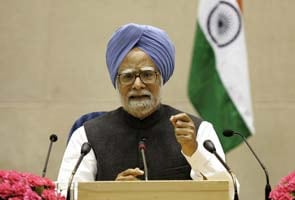
New Delhi:
The Prime Minister has said that the Right to Information Act is not being used to its full potential. "This important legislation should not be only about criticising, ridiculing, and running down public authorities," he said. "RTI should be more about promoting transparency and accountability, spreading information and awareness and empowering the citizen."
Earlier this week, Dr Manmohan Singh, whose government is being targeted for intractable corruption, said that a "mindless atmosphere of negativity" over corruption was damaging the country and he feared for the morale of civil servants.
Today, he expressed concerns about "frivolous" applications and the invasion of privacy, he said that "the potential for good, constructive use of the Right to Information is perhaps far greater than what its current status would indicate."
At the annual conference of state and Central Information Commissioners who implement the RTI, Dr Manmohan Singh also said that the government will appeal against a recent Supreme Court verdict that calls for retired judges to lead information commissions across the country. The country has a national information commission to hear RTI appeals and to enforce the act; each state has its own Information Commission.
The Right to Information Act was a showpiece achievement of the Prime Minister's first coalition government UPA-1. It was introduced in 2005 to increase transparency and check corruption.
The Prime Minister said that the government will appeal against the recent Supreme Court order on the Right to Information Act. A few weeks ago, the court delivered an order that will change how the Right to Information (RTI) machinery - information commissions in states and at the Centre - will work. The Supreme Court ruled that any RTI application must be heard by two people, of which one must be a legal expert. Each state in India has its own Information Commission which processes RTI applications. The Supreme Court ruled that the Information Commission in every state must be headed by either retired or serving judges. The verdict also said the Chief Information Commissioner (CIC) at the Centre must be either a former Chief Justice of India or of a High Court.
Earlier this week, Dr Manmohan Singh, whose government is being targeted for intractable corruption, said that a "mindless atmosphere of negativity" over corruption was damaging the country and he feared for the morale of civil servants.
Today, he expressed concerns about "frivolous" applications and the invasion of privacy, he said that "the potential for good, constructive use of the Right to Information is perhaps far greater than what its current status would indicate."
At the annual conference of state and Central Information Commissioners who implement the RTI, Dr Manmohan Singh also said that the government will appeal against a recent Supreme Court verdict that calls for retired judges to lead information commissions across the country. The country has a national information commission to hear RTI appeals and to enforce the act; each state has its own Information Commission.
The Right to Information Act was a showpiece achievement of the Prime Minister's first coalition government UPA-1. It was introduced in 2005 to increase transparency and check corruption.
The Prime Minister said that the government will appeal against the recent Supreme Court order on the Right to Information Act. A few weeks ago, the court delivered an order that will change how the Right to Information (RTI) machinery - information commissions in states and at the Centre - will work. The Supreme Court ruled that any RTI application must be heard by two people, of which one must be a legal expert. Each state in India has its own Information Commission which processes RTI applications. The Supreme Court ruled that the Information Commission in every state must be headed by either retired or serving judges. The verdict also said the Chief Information Commissioner (CIC) at the Centre must be either a former Chief Justice of India or of a High Court.
Track Latest News Live on NDTV.com and get news updates from India and around the world

